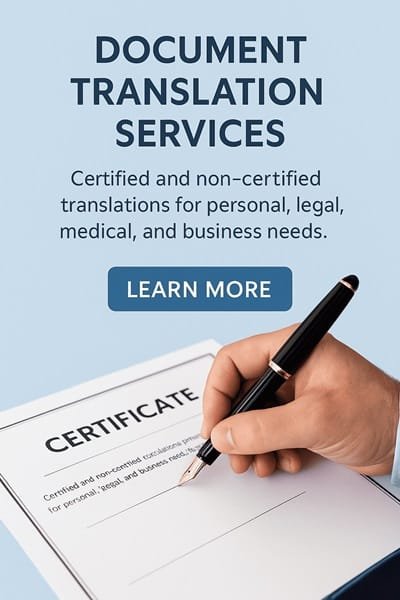Certified Translation Services UK – Lowest Rates Guaranteed!
Professional Human Translation Services across the UK — Fast delivery from 12 hours with full support via Phone, Email, and WhatsApp. Certified translation services in Leicester, delivered UK-wide (London, Birmingham, Manchester, Liverpool, Leeds, Bristol) and internationally..
Welcome to Best Language Services Ltd (BLS), a Leicester-based translation agency offering certified translation services across the UK. Serving Leicester (Leicestershire) and major cities including London, Birmingham, Manchester and Bristol, we deliver accurate, fast translations in 200+ languages.
At BLS we offer wide-range of document translation services. We provide a broad range of translation services, tailored to meet the needs of businesses, government institutions, and individuals:
Legal Document Translation:
Contracts, patents, court rulings, and more.
Business and Financial Translation:
Business plans, financial reports, marketing materials.
Medical and Healthcare Translation:
Medical records, clinical trial data, patient information.
Technical and Scientific Translation:
Research papers, user manuals, technical guides.
Certified Translation Services
Offering certified & official translation services
Sworn Translation Services
Birth certificates, marriage certificates, diplomas for visa and immigration processes for EU.
Sports Translation Services
Contracts, patents, court rulings, and more.
Marketing and Advertising Translation:
Translated campaigns, brochures, and promotional content.
Certified Translation Services Agency UK - Fast, Reliable, Affordable!"
Welcome to Best Language Services Ltd (BLS), a Leicester-based translation agency providing certified translation services across the UK in 200+ languages. We are a Leicester translation agency specialising in certified translations for official use, and we’re trusted for translation services in Leicester for birth certificates, marriage certificates, diplomas and legal documents. Based in Leicester, we support clients across Leicestershire and the UK with fast turnaround and secure online ordering.
For added reassurance, you can also find our service listed on the Leicestershire County Council local directory and MyChoice Leicester City.
Whether your company is expanding internationally or you need document translations for immigration, education, legal or business use, we provide accurate, dependable solutions tailored to your requirements. Check the UK cities where you can order our translation and interpreting services.
Enquire now about our certified translation services for UK official requirements and overseas use — Get a free quote now!
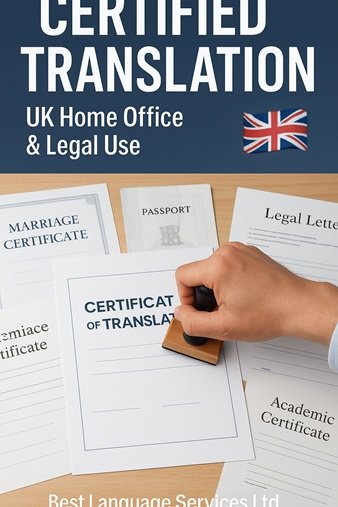
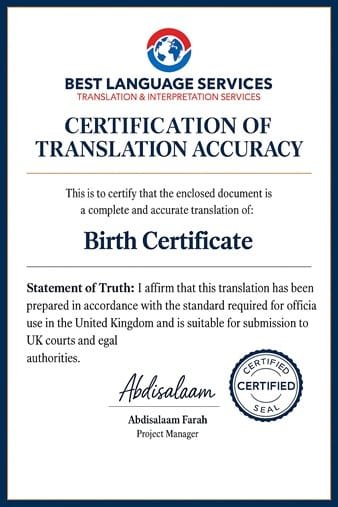
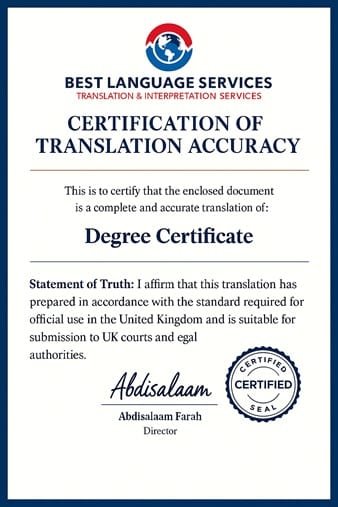
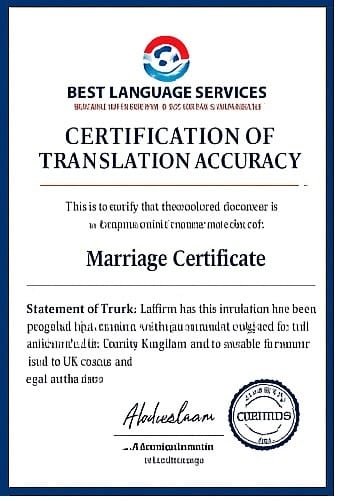
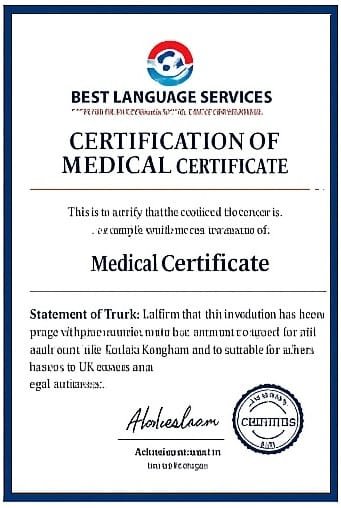
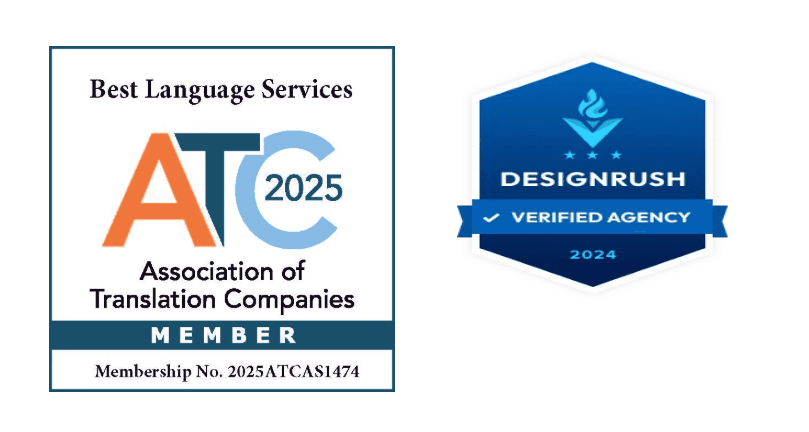

Trustindex verifies that the original source of the review is Google. Excellent translation services provider. James Nelson was amazing. Thank you so much!Posted onTrustindex verifies that the original source of the review is Google. Thank you so much for the great service. I had excellent experience with Best Language Services Ltd.Posted onTrustindex verifies that the original source of the review is Google. Very good reliable servicesPosted onTrustindex verifies that the original source of the review is Google. Great company to work with. Very quick to respond, reasonably priced and friendly. Did exactly what I needed, and within a good time frame. Thank youPosted onTrustindex verifies that the original source of the review is Google. Excellent translation services.Posted onTrustindex verifies that the original source of the review is Google. I received a quote quickly, made the payment, and had my translation ready overnight! Great and quick communication via WhatsApp. Thank you for the fast and perfect translation of my Belgian marriage certificatePosted onTrustindex verifies that the original source of the review is Google. Posted onTrustindex verifies that the original source of the review is Google. Very helpful. Good fast service.Posted onTrustindex verifies that the original source of the review is Google. Very good and speedy service. The translation was perfect and very reasonably priced. Communication was perfect and very quickPosted onTrustindex verifies that the original source of the review is Google. I got my daughter’s transcripts translated and couldn’t be more pleased. The service was fast, professional, and easy to work with. Communication was clear, and I’ll definitely be coming back. Highly recommend .
Certified, Legal & Fast Translation Services – Frequently Asked Questions (FAQs)
Certified translation services involve translating documents with an official certification of accuracy. This certificate confirms that the translation is a true and accurate representation of the original. At Best Language Services Ltd., we provide certified translations accepted by UK authorities such as the Home Office, courts, and academic institutions.
You need certified translation services when submitting documents to official bodies such as the Home Office, DVLA, HMRC, universities, or courts. Common documents include birth certificates, marriage certificates, academic transcripts, legal contracts, and medical reports.
Our document translation services cover a wide range of personal, legal, business, and academic documents. We translate birth and marriage certificates, diplomas, contracts, financial statements, and more. All translations can be certified, sworn, or notarised upon request.
Yes, we specialise in legal translation services for court submissions, immigration cases, contracts, affidavits, and official correspondence. Our legal translators are experienced in handling complex terminology and ensuring compliance with UK legal standards.
Our fast translation services include same-day, 24-hour, and priority delivery options. We work with urgent requests across the UK and abroad, ensuring you get your certified translations quickly without compromising on quality.
Getting a quote is easy! Just use our Get a Free Quote form, email your documents to contact@bestlanguageservices.com, or send them via WhatsApp. We’ll assess your request and respond quickly with a quote for our fast and professional translation services.
Professional Document Translation Services in the UK
We provide certified and non-certified document translation services for personal, legal, medical, and business needs. Whether you need your birth certificate, university diploma, or company contract translated, Best Language Services delivers accurate, professional results accepted by UK and international authorities.
- Birth, marriage, bank statements and death certificates
- Academic transcripts and diplomas
- Contracts and business reports
- Medical and legal documents
Who Needs Certified Translations?
Certified translations are required by various organisations and institutions, including:
The Home Office:
For immigration, visa applications, and residency permits.
DVLA:
For translating driving licenses, vehicle registrations, and related documents.
HMRC:
For official tax documents and legal agreements.
Courts and legal institutions:
For translating contracts, affidavits, and other legal paperwork.
Embassies and consulates:
For visa applications and diplomatic purposes.
Universities and educational institutions:
For academic transcripts and diplomas when studying or working abroad.
NHS:
For translating medical records, patient information, and healthcare-related documents.
Why Choose Our Certified Document Translation Services in the UK?
At Best Language Services Ltd, we specialise in delivering fast translation services that are accurate, fully certified, and trusted across the UK. Whether you need professional document translation for immigration, legal proceedings, academic applications, or business transactions, our expert team provides reliable translations in over 200 languages. From birth and marriage certificates to technical manuals and financial reports, we guarantee every translation meets the official requirements of the Home Office, courts, universities, and other UK authorities. As a registered member of the Information Commissioner’s Office (ICO), we ensure your sensitive documents are processed with complete confidentiality and in line with the highest data protection standards.

Here are Some of the Certified Document Translations We Offer.
We offer certified document translations for a wide range of official documents, including:

Document Translation Services UK
Our certified document translation services cover personal, legal, and business documents, certified for official use in the UK and globally.

Legal Document Translation UK
Our official legal document translation services ensure accuracy and compliance, ideal for court documents, immigration, and business contracts.

Birth Certificate Translation Service
Get your birth certificates translated and certified for any legal purpose, accepted by UK and international authorities. turnaround times and hassle-free processes for all legal requirements.

Marriage Certificate Translation Service
Our marriage certificate translation service guarantees that your document is accurately translated and certified for official use in the United Kingdom. We assure you of the utmost legal compliance and the most dependable, rapid delivery possible.

School and University Diplomas
Our diploma translations are professionally certified for use by educational institutions and employers worldwide.

Passports / visa documents
We offer certified translation of passports, visas, and immigration documents. Our fast translation services meet immigration authority standards, ensuring smooth processing and acceptance for all your official needs.

Contracts / business documents
We provide certified translations for contracts and business documents. Our translations ensure legal accuracy and compliance with business standards for smooth international transactions.

Technical Documents Translation UK
We provide expert technical translations for engineering, IT, and other specialized industries, ensuring precision and professionalism.



